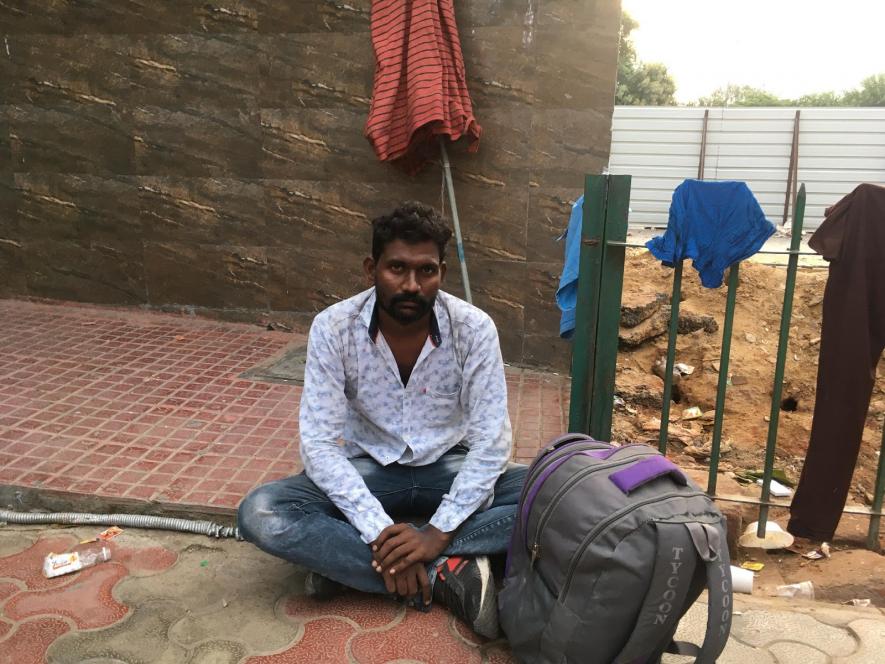Migrants in Gurugram: Economically Broke and Politically Powerless

Vijay is a daily wage labourer. He is sitting dejected with his possessions—wrapped up in a backpack—at the station, waiting for a bus to return to his hometown back in Uttar Pradesh. He came to Gurugram 11 months ago and started working as a truck unloader in an auto component manufacturing unit. Three months ago, he lost his job without receiving payment for nearly 20 days and since then he had been looking for another job. However, with the economic slowdown all his efforts have born no efforts.
Vijay knows the city of Gurugram and the issues that it faces. The road to his room’s building is in a deplorable condition, he told NewsClick. His landlord used to overcharge him for the electricity and as he was not able to find another job, he knows how unemployment has grasped the city.
However, Vijay can only complaint. Despite him being willing to vote in the upcoming Haryana Assembly elections he won’t be able to, since he doesn’t have Gurugram’s voter identity card.
“With no identity, I am an outsider here and I am among those who suffer the most,” says Vijay.
Also read: Assembly Elections: Will People Sleep Over Real Issues in Haryana?
He, being a migrant worker, is not alone and the debate surrounding giving voting rights to migrant workers is not a fresh one either. However, the subject begs attention as Gurugram, the country’s largest automotive hub, is set to go to polls this month. The city’s economy is currently gripped with one of the worst economic slowdowns, whose first targets are individuals like Vijay, who were often brought in as cheap labourers to develop the industrial sectors. Lack of any political representation have cost them dearly.
The migrant workers move out of their native places in search of work. Often receiving the worst welcome from the city, the workers face denial of basic entitlements including access to subsidised food, proper drinking water, sanitation and public health facilities, limited or no access to state-provided welfare services which translate to inhumane living conditions. What’s more, their protests often get muted and their grievances are overlooked by the political fronts since they don’t have any votes.
The Indian law, however, allows for more than this. According to the Representation of the People Act, any person can be registered to any constituency where he is “ordinarily resident”. In case of migration to another constituency, a proof of the new residence is needed to get enrolled in the voters’ list of that constituency.
When Vijay was asked for his residence proof, he laughed it off. During his stay in Gurugram, he didn’t know anyone who was provided with a residence proof.
“The room is showed to us and if the rent is affordable, one can move in the very same day,” he explains, adding, “The landowners collect a copy of our identity card, however, no proof is given to us.”
In 2015, responding to the demands of the left political parties that a voting system must be made available to domestic migrants, Election Commission of India took cognizance of the issue and had asked the Tata Institute of Social Sciences (TISS) to conduct a study on understanding the character and structure of internal migration in the country.
The report submitted noted that “scant attention” has been paid to the political participation of the migrant—especially seasonal or short-termed—workers who are often denied voting rights in their destination place, and debilitating transportation costs are imposed in case they decided to vote in their place of origin.
The report also concluded that higher rates of in-migration to a state are associated with lower voter turnouts, an interesting relation establishing the lack of political representation of this army of socio-economically deprived group in the Indian elections.
As far as Haryana is concerned, according to the Census 2011, it is one of the top five states that has recorded high in-migration. In the recent months, the state of Haryana also faced the worst of the economic crisis, with core industries of the state – like auto and textile – facing a slump in their production and workers losing their job. According to Centre for Monitoring Indian Economy (CMIE) estimates, Haryana recorded 20.3% rate of unemployment in the month of September this year. The stream of migrant labourers in the state, mostly employed in such factories on contractual basis, have now been left in the lurch. The crisis has broke them economically and the Assembly election brings them no hope, since they are powerless.
Also read: Assembly Polls: ‘Not All Safai Karamcharis in Haryana Equal’
One can meet a myriad of such migrants, mostly from states like Uttar Pradesh and Bihar, who are now driving an auto or have become a street hawker. They add to the economy of a megalopolis like Gurugram, but remain absent from the political fallouts.
“I can never call this my city,” says Vijay, as he prepared for his return to his native village where three of his sons are waiting for him.
Get the latest reports & analysis with people's perspective on Protests, movements & deep analytical videos, discussions of the current affairs in your Telegram app. Subscribe to NewsClick's Telegram channel & get Real-Time updates on stories, as they get published on our website.
























